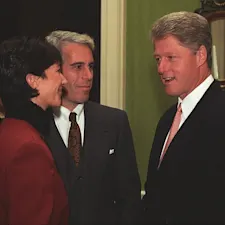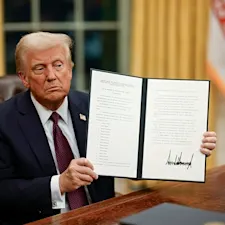
427-1: Higgins Stands Alone Against Epstein File Release
Official portrait of Representative Clay Higgins, Louisiana, 2017. Photo by Official House Photographer, Dana Barciniak. Public domain.
Rep. Clay Higgins stood alone in a sea of nearly unanimous support when the House of Representatives voted on the Epstein Files Transparency Act. On a day when 427 members backed the bill, Higgins was the sole dissenting voice, casting a "NO" vote that immediately drew attention. The bill, designed to force the Justice Department to release all unclassified records related to Jeffrey Epstein and his co-conspirator Ghislaine Maxwell, sailed through the House and was poised for swift Senate approval without amendments.
A Lone Voice of Opposition
Higgins, a five-term Republican congressman from Louisiana's 3rd District, is no stranger to controversy. Known for his background as a law enforcement officer and active reserve agent with the Louisiana Department of Justice, he is also a prominent member of the House Freedom Caucus, a group known for its conservative stances. His opposition to the bill was clear and principled, rooted in concerns about the potential harm the legislation could cause to innocent people.
In a post on Twitter, Higgins explained that the bill "abandons 250 years of criminal justice procedure in America," as reported by CBS News. He warned that, as written, the legislation "reveals and injures thousands of innocent people — witnesses, people who provided alibis, family members, etc." His argument centered on the fear that a broad release of investigative files could inadvertently expose individuals who are not implicated in any wrongdoing but are nonetheless named in the documents.
The Bill's Overwhelming Support
Despite Higgins' concerns, the bill passed the House with overwhelming bipartisan support. The vote tally of 427-1 underscored the rare moment when congressional Republicans broke ranks with President Donald Trump, who had initially opposed the measure. Trump's opposition had been a significant roadblock for months, with the president calling the Epstein investigation a "hoax" and pressuring lawmakers to avoid supporting the bill, as reported by The Hill. However, in a late reversal, Trump announced he would sign the bill into law, clearing the way for its passage.
The legislation requires the Justice Department to release "all unclassified records, documents, communications, and investigative materials" related to Epstein and Maxwell within 30 days of the bill's enactment, as reported by CBS News. It also mandates disclosure of individuals, including government officials, named in connection with Epstein's criminal activities, civil settlements, immunity or plea agreements, or investigatory proceedings. The bill explicitly prohibits withholding or redacting records based on embarrassment, reputational harm, or political sensitivity, even if those records involve public figures or foreign dignitaries.
Privacy Protections and Legislative Debate
The bill does include provisions allowing the attorney general to withhold or redact information that contains personally identifiable details of victims or ongoing investigations, as well as material that could harm national security. Any redactions must be explained in notices to Congress. Still, Higgins and others, including House Speaker Mike Johnson, expressed concerns that the bill's language was too broad and could lead to unintended consequences.
Johnson, who ultimately voted for the bill, described it as a "raw and obvious political exercise" but acknowledged the political pressure to support transparency, as reported by the Associated Press. He voiced worries about disclosing sensitive information that is typically kept private in federal investigations, including details about victims and whistleblowers.
Higgins echoed these concerns, emphasizing that the House Oversight Committee was already conducting a thorough investigation and had released over 60,000 pages of documents related to the Epstein case. According to CBS News, he indicated that he would support the bill if the Senate amended it to better protect the privacy of victims and innocent individuals named in the files. However, Senate Majority Leader John Thune quickly dismissed the idea of amendments, noting the bill's overwhelming House support and the president's commitment to sign it.
Political Dynamics and Fallout
The passage of the bill marked a rare moment of Republican defiance against Trump's wishes. For months, Trump had pressured House Republicans to oppose the bill, even summoning them to the White House in a last-ditch effort to remove their names from a discharge petition that forced the bill to the floor. His efforts failed spectacularly, with many Republicans breaking ranks to support the measure, signaling a potential shift in the party's internal dynamics.
Rep. Thomas Massie, a lead sponsor of the bill, suggested that Trump's late endorsement was a face-saving move, as the bill would have passed with or without his support, as reported by The Hill. Massie estimated that about 100 Republicans would have voted for the bill regardless, enough to overcome a potential presidential veto. The episode highlighted growing tensions between Trump and some "America First" Republicans who are willing to push back on the former president's directives.
Voices From the Survivors and Advocates
Outside the Capitol, survivors of Epstein's abuse gathered to witness the vote, many expressing exhaustion from years of fighting both the trauma and the political battles surrounding the case. Rep. Marjorie Taylor Greene, a Republican who stood with survivors, praised their resilience and the bipartisan effort to bring transparency to the Epstein files. She criticized Trump's initial opposition, saying it had "ripped MAGA apart," as reported by the Associate Press.
Survivors like Jena-Lisa Jones, who had voted for Trump, pleaded with the president to stop politicizing their trauma, as reported by the Associated Press. Their presence underscored the human stakes behind the legislative fight and the demand for accountability from powerful figures connected to Epstein.
What's Next?
With the Senate's unanimous consent to pass the bill as written, the Justice Department is now under a legal mandate to release the Epstein files within 30 days. The department can redact sensitive information but must provide explanations for any withheld material. Higgins' hope for amendments to better protect privacy appears unlikely, given the Senate's swift action and leadership's stance.
The bill's passage represents a significant moment in the ongoing saga of Jeffrey Epstein's criminal network and the political forces surrounding it. Higgins remains the lone voice in the House cautioning against the bill's broad scope, standing firm on his belief that the legislation, as it stands, risks harming innocent people caught in the crossfire of public disclosure.
Whether his concerns will prompt future legislative tweaks or oversight remains to be seen. For now, the Epstein Files Transparency Act moves forward, promising to shed light on one of the most notorious criminal cases of recent decades.
References: Who voted against releasing the Epstein files? Rep. Clay Higgins explains his opposition to the House's bill | Clay Higgins was the only Republican to vote against the Epstein files release. Here's what he said | Epstein bill passage a rare sign of Trump losing command of Republicans | Congress acts swiftly to force release of Epstein files | Who is Clay Higgins, the only House member to vote against releasing the Epstein files?
























